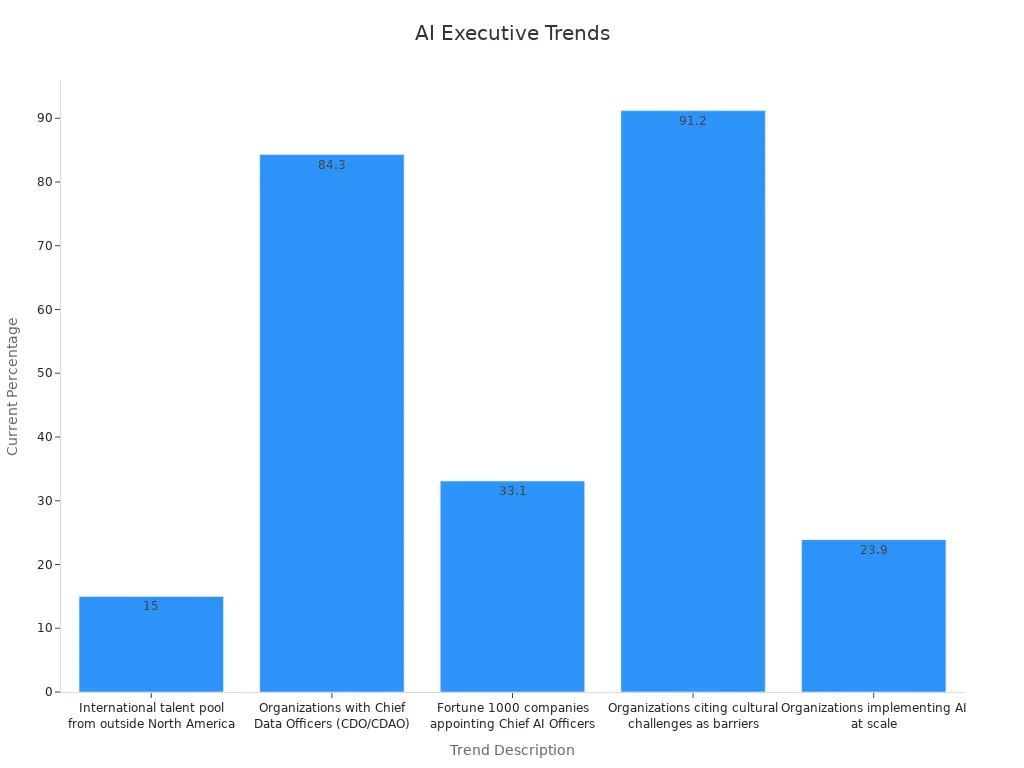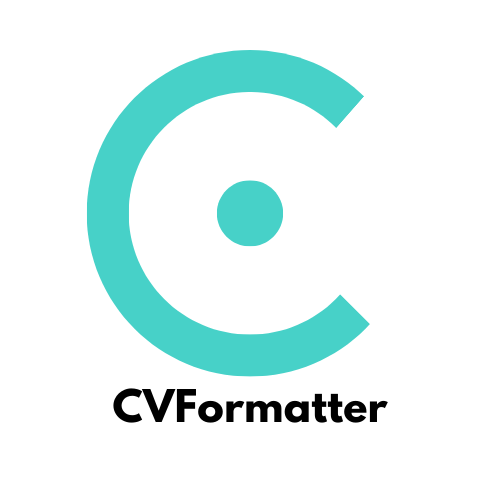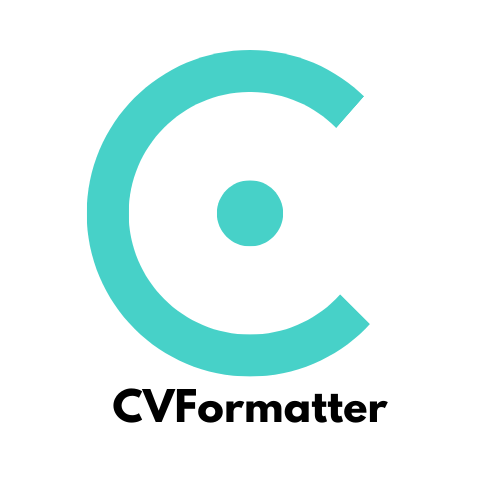How AI is Transforming Executive Search

AI is transforming executive search by making candidate sourcing faster and smarter. You can now find qualified candidates with greater efficiency, thanks to AI's ability to scan job boards and social media platforms automatically. For example, while only 12% of employers currently use AI for talent management, its adoption has proven to reduce time-to-hire significantly. AI-powered tools can pre-screen resumes, perform assessments, and even conduct interviews, streamlining the recruiting process.
More organizations are recognizing the advantages of AI transforming executive search. Nearly 40% use AI to automate resume screening, saving time by filtering candidates based on clear criteria. This technology also helps promote fairness, as 68% of recruiters believe AI eliminates unintended bias. By adopting AI, you can shift focus from repetitive tasks to strategic decision-making, transforming how you approach executive hiring.
Key Takeaways
AI helps find and check candidates quickly and easily.
Predictive tools show how well candidates might do in jobs.
AI handles simple tasks, giving you more time for planning.
AI makes hiring fair by cutting down on bias.
Using AI with human skills improves executive searches.
Key Changes Brought by AI in Executive Search

Enhanced Candidate Sourcing and Screening
AI technology has revolutionized how you source and screen candidates, making the process faster and more precise. Traditional methods often relied on manual searches and limited networks, but AI-driven executive search tools now allow you to tap into a global talent pool. For instance, international talent pools outside North America have grown by 15%, up from just 7.4%. This expansion ensures you can identify top talent regardless of geographical boundaries.
AI-powered algorithms can analyze vast amounts of data from resumes, social media profiles, and professional networks. These tools identify candidates who not only meet the technical requirements but also align with your organization's culture. McKinsey's research highlights a growing demand for social and emotional skills among executives, emphasizing the importance of finding well-rounded leaders. AI simplifies this by analyzing language cues and assessing soft skills like emotional intelligence.
"AI and big data analysis can provide useful insights into client needs, candidate profiles, and detailed market mapping. For example, AI will, in time, provide predictive analysis to determine the likely success of candidates, creating efficiencies in candidate search and optimizing the candidate and client acquisition process."
Additionally, AI helps you identify passive candidates—those not actively seeking new roles but open to opportunities. This capability ensures you don't miss out on exceptional talent. By automating resume screening, AI reduces time spent on repetitive tasks, allowing you to focus on strategic aspects of recruiting.
Predictive Analytics for Better Hiring Decisions
Predictive analytics has become a cornerstone of executive search in the age of AI. This advanced capability enables you to make data-driven decisions, reducing the risks associated with hiring top talent. AI analyzes historical hiring trends, candidate performance metrics, and cultural indicators to predict a candidate's likelihood of success in a specific role. For example, it evaluates career trajectories and skill sets to forecast how well a candidate will thrive in your corporate environment.
AI's predictive capabilities extend beyond technical skills. Sentiment analysis and behavioral assessments provide insights into a candidate's communication style and leadership potential. These tools help you match candidates to roles where they can excel, ensuring long-term success for both the individual and the organization.
AI-driven recommendations enhance the matching process for high-level roles.
Predictive analytics identifies candidates with the best chance of thriving in specific corporate cultures.
AI evaluates past recruitment data to refine future hiring strategies.
This approach not only improves the quality of executive job placements but also supports personalized executive search strategies. By leveraging predictive analytics, you can confidently select candidates who align with your organization's goals and values.
Automating Administrative Tasks for Efficiency
AI technology excels at automating administrative tasks, freeing up your time to focus on building relationships and making strategic decisions. Tasks like scheduling interviews, managing candidate databases, and formatting resumes can now be handled seamlessly by AI-powered tools. For example, recruitment software like CVFormatter automates resume formatting, saving up to 90% of the time typically spent on this task. This efficiency allows you to engage more deeply with candidates and clients.
Organizations using AI in recruitment report significant efficiency gains. Data-driven recruitment strategies enhance hiring quality by 27%, while 65% of companies experience reduced costs. Automating scheduling and candidate management ensures you can dedicate more time to high-value activities, such as advising clients and understanding their unique needs.
Benefit | Description |
|---|---|
Improved Efficiency | AI enhances recruitment processes, allowing recruiters to focus on strategic tasks. |
Reduced Costs | Automating recruitment processes significantly lowers cost-to-hire and improves retention. |
Enhanced Candidate Quality | AI identifies candidates with the right skills and cultural fit, improving overall candidate quality. |
AI-powered automation also accelerates processes like screening resumes, enabling you to engage with promising candidates sooner. By reducing time to hire, you can stay competitive in the fast-paced world of executive search.

Incorporating AI into your workflow not only streamlines operations but also enhances the overall experience for both candidates and clients. By automating repetitive tasks, you can focus on what truly matters—hiring top talent and building lasting relationships.
Promoting Diversity and Inclusion Through Bias Detection
AI is reshaping how you approach diversity and inclusion in executive search. Traditional hiring methods often carry unconscious biases, which can limit opportunities for underrepresented groups. AI-powered tools help you detect and reduce these biases, ensuring a fairer recruitment process.
One way AI promotes inclusivity is by analyzing job descriptions. Tools like Textio help you create gender-neutral and jargon-free postings. Cisco, for example, used Textio to refine its job descriptions, leading to a 10% increase in female candidates. By making small adjustments, you can attract a broader and more diverse talent pool.
AI also enhances resume screening by focusing on skills and experiences rather than demographic details. Amazon's AI-driven recruitment system allowed candidates to showcase their qualifications beyond traditional resumes. This approach resulted in more diverse hires, as it prioritized potential over superficial factors. By leveraging AI, you can uncover hidden talent that might otherwise go unnoticed.
However, it’s important to recognize that AI is not a perfect solution. If the data used to train AI systems contains biases, those biases can persist. Researchers Miasato and Silva (2019) emphasize that while AI can mitigate bias, it cannot eliminate discrimination entirely. To address this, you should regularly audit your AI tools and ensure they rely on diverse and representative datasets.
AI also helps you identify patterns of bias in hiring decisions. For instance, it can analyze historical recruitment data to highlight disparities in candidate selection. This insight allows you to adjust your strategies and create a more equitable hiring process. By using AI to detect and address bias, you can build a more inclusive workplace culture.
Incorporating AI into your executive search strategy not only promotes fairness but also strengthens your organization. Diverse teams bring fresh perspectives and innovative ideas, driving better business outcomes. By embracing AI, you can ensure that your hiring practices align with your commitment to diversity and inclusion.
The Role of Human Expertise in Executive Search
Contextual Understanding in Complex Hiring Scenarios
AI has transformed many aspects of recruiting, but it cannot replace the depth of understanding you bring to complex hiring scenarios. When recruiting for executive roles, you often face challenges that go beyond matching skills to job descriptions. These roles demand leaders who can seamlessly integrate into a company’s culture while navigating high-stakes responsibilities.
Recruiting C-level executives requires you to assess not just qualifications but also cultural fit and adaptability.
Human recruiters excel in nuanced judgment, understanding the strategic vision and leadership qualities needed for success.
AI tools can analyze data and predict outcomes, but they lack the intuition and contextual awareness you provide. For example, identifying whether a candidate’s leadership style aligns with a company’s values often requires a human touch. Your ability to interpret subtle cues, such as how a candidate communicates or handles pressure, ensures a more accurate evaluation.
By leveraging your expertise, you can address the complexities of executive search that AI cannot fully grasp. This combination of human insight and AI-driven efficiency creates a balanced approach to hiring top talent.
Building Trust and Relationships with Candidates
Trust plays a pivotal role in executive search, especially when engaging with high-level candidates. While AI can streamline processes, it cannot replicate the human connection you establish through authentic interactions. Building trust requires empathy, responsiveness, and credibility—qualities that only you can bring to the table.
Executive candidates value relationships built on authenticity and mutual respect. Demonstrating empathy and understanding fosters trust and encourages open communication.
Responsiveness and reliability strengthen your credibility, making candidates more likely to engage with you throughout the hiring process.
High-quality relationships also lead to better outcomes. When candidates trust you, they are more likely to share their true aspirations and concerns. This transparency helps you align their goals with the organization’s needs, ensuring a successful placement.
AI tools can assist with initial outreach, but the depth of trust required for executive recruiting depends on your ability to connect on a personal level. By prioritizing relationship-building, you create a foundation for long-term success in executive search.
Navigating Nuanced Decision-Making Processes
Executive search involves decisions that go beyond data and algorithms. While AI enhances efficiency, it cannot replace the nuanced judgment required for senior-level hiring. You play a critical role in evaluating factors like cultural alignment, leadership potential, and strategic vision.
Executive placements demand a deep understanding of industry trends and organizational dynamics. Your expertise ensures that candidates align with the company’s long-term goals.
Final hiring decisions often hinge on qualities like emotional intelligence and adaptability, which AI cannot accurately assess.
AI can handle administrative tasks but lacks the ability to make nuanced decisions.
Senior-level hiring requires personal engagement and contextual understanding.
Emotional intelligence remains a key factor in evaluating candidates, highlighting the importance of human expertise.
Your role also involves providing accountability and support throughout the hiring process. Personalized consultations and long-term relationships with clients and candidates ensure that decisions are well-informed and aligned with organizational values. By combining your expertise with AI tools, you can navigate the complexities of executive search with confidence.
Challenges and Ethical Considerations in AI-Powered Executive Search
Addressing Bias in AI Algorithms
AI has the potential to revolutionize recruiting, but it also carries risks, especially when it comes to bias. Algorithms often reflect the data they are trained on, which can lead to unintended consequences. For example:
Screening tools may replicate human biases if the training data includes flawed hiring patterns.
Historical hiring preferences, such as favoring male candidates, can influence AI to continue these trends.
Algorithms might prioritize candidates living closer to the office, unintentionally excluding those from certain neighborhoods.
These biases can undermine diversity goals and limit opportunities for underrepresented groups. To address this, you should regularly audit your AI systems and use diverse datasets. By doing so, you can ensure that your recruiting process aligns with your commitment to fairness and inclusivity.
Ensuring Data Privacy and Security
AI-driven executive search relies heavily on data, making privacy and security critical concerns. Mishandling sensitive information can lead to breaches and erode trust. To mitigate these risks, you should implement robust safeguards, such as:
Data stewardship practices to prevent misuse of personal information.
Transparency rules that help candidates understand how their data is used.
Governance frameworks requiring privacy officers and regular impact assessments.
Risk assessments also play a vital role in identifying potential vulnerabilities in automated decision-making. By prioritizing data security, you not only protect candidates but also enhance your organization's reputation as a trustworthy recruiter.
Balancing Automation with Human Judgment
While AI excels at automating tasks, it cannot replace the intuition and expertise you bring to executive recruiting. Human oversight ensures ethical decision-making and helps navigate complex scenarios. For instance:
Experts can evaluate context-specific factors, such as cultural alignment and leadership potential.
Human judgment mitigates risks like over-reliance on algorithms or ethical oversights.
Teams can use AI insights to make objective decisions while avoiding speculation.
By combining AI's efficiency with your unique skills, you create a balanced approach that delivers better outcomes. This synergy ensures that technology supports, rather than replaces, the human element in executive search.
Future Trends in AI Transforming Executive Search

AI-Powered Communication Tools for Recruitment
AI-powered tools are reshaping communication in recruiting, making interactions faster and more personalized. These tools streamline candidate engagement by automating responses, scheduling interviews, and providing real-time updates. For example, chatbots powered by AI can answer candidate queries instantly, ensuring a smoother experience. This technology reduces delays and enhances transparency, which is critical for executive search.
AI also enables predictive communication strategies. By analyzing candidate behavior, these tools can recommend the best times to reach out or suggest tailored messages. This approach fosters stronger connections and improves the candidate experience. As the future of hiring evolves, AI-powered tools will play a pivotal role in creating efficient and meaningful communication channels.
Integration of VR/AR in Executive Search Processes
Virtual reality (VR) and augmented reality (AR) are transforming how you assess and engage candidates. These technologies allow candidates to experience roles in immersive environments, providing a realistic preview of job responsibilities. Research shows that 65% of candidates are more likely to accept offers after experiencing the role through technology. This trend highlights the importance of integrating VR/AR into your recruiting strategy.
VR can also enhance skill assessments. Candidates can demonstrate their abilities in simulated scenarios, offering insights into their problem-solving and leadership capabilities. This method ensures a fair evaluation while reducing biases associated with traditional assessments. With 49% of candidates rejecting offers due to poor recruiting experiences, VR/AR can significantly improve engagement and satisfaction.
By adopting VR/AR, you can elevate the executive search process, making it more interactive and appealing to top talent. These technologies not only enhance assessments but also strengthen your organization's reputation as an innovative recruiter.
Combining AI with Human-Centric Hiring Practices
The future of hiring lies in balancing AI tools with human-centric approaches. AI excels at automating tasks and analyzing data, but human expertise remains essential for emotional intelligence and relationship-building. Combining these strengths creates a more effective recruitment strategy.
For instance, AI tools reduce time-to-fill positions by up to 50%, allowing you to focus on strategic activities like assessing cultural fit. Human-centric practices enhance retention rates by prioritizing personalized engagement and ensuring candidates align with organizational values. This synergy also improves diversity, as AI identifies a broader range of candidates while human recruiters foster meaningful connections.
Benefit | AI Tools Contribution | Human-Centric Practices Contribution |
|---|---|---|
Recruitment Efficiency | Focus on strategic activities requiring emotional intelligence | |
Cost Savings | Average 30% reduction in cost-per-hire | Reduced administrative work and external recruiter fees |
Retention Rates | Up to 25% improvement in retention rates | Enhanced candidate experience and cultural fit assessment |
Diversity Improvement | 16-20% increase in representation | Personalized candidate engagement and relationship building |
By combining AI-powered tools with human-centric hiring practices, you can achieve better outcomes in executive search. This approach ensures that technology supports, rather than replaces, the human element, creating a balanced and effective recruitment process.
AI is transforming executive search by making processes faster, smarter, and more accurate. It enhances efficiency by automating tasks and improves decision-making with data-driven insights. However, your expertise remains essential for understanding complex scenarios, building trust, and making nuanced decisions. While AI excels at analyzing data, only you can provide the human connection that executive recruiting demands.
The future of executive search lies in combining AI's capabilities with your unique skills. This balanced approach ensures you can leverage technology while maintaining the personal touch needed to hire exceptional leaders.
See Also
Creating An Effective Recruitment Strategy For Rapidly Growing Companies
Best 10 AI Tools For Crafting Resumes For Recruiters
Utilizing AI Resume Formatting To Enhance Efficiency In Recruitment
Comparing Recruitment Agency Advantages And In-House Hiring For 2025


